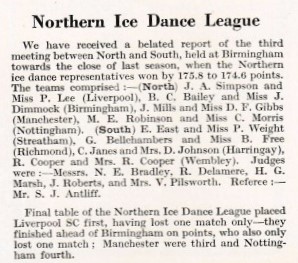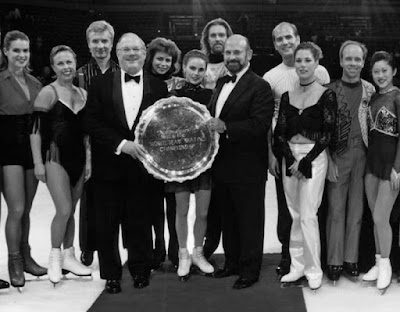Photo courtesy Hannah Busing
As teams from Canada, Japan, the United States, France, Korea and Italy battle for prize money and bragging rights at the 2023 ISU World Team Trophy in Tokyo, I thought it might be fun to take a quick look back at the history of team figure skating competitions.
The very definition of the word team is a group of people coming together to achieve a common goal. With that in mind, the earliest examples of a team skating together would be English Style and fours skating, disciplines whose roots trace back to the nineteenth century. Synchro skating is another obvious example. However, what we will be looking at today are competitions where a team comprised of skaters in multiple disciplines received cumulative scores.
One of the earliest examples of a prize being awarded to a group of skaters from multiple disciplines was perhaps the Earl Grey Challenge Trophy, "a handsome statuette in bronze", awarded to the skating club who earned the most points at the Canadian Championships at the turn of the century. The first winners of the Earl Grey Challenge Trophy were the Minto Skating Club. Somewhat confusing matters, Governor General Grey also generously donated cups and trophies for the winners of the singles and fours events during the Edwardian era.
Team-style trophies were pondered in the United States as early as the 1920's. In 1928, Richard L. Hapgood remarked, "Team competition stresses the club rather than the individual. Most figure skaters take the sport seriously enough to form definite opinions on questions of style, procedure and so forth. These opinions are often contrary and widely divergent. Conflicting schools of skating thought have developed not only among the different localities of the country but also within most skating clubs. Such differences of opinion, while well-intentioned and having the best good of skating at heart, often cause ill-will and rancor among club members. Team competition offers a way out of these difficulties, for individual differences, whether petty or fundamental, will be sunk in a common desire to unite and work for the good of the club and its team. Secondarily team competition offers a definite stimulus to the development of young skaters. The honor of making the club team could hold easily as much inducement as the somewhat more elusive goal of winning a national or national junior championship. Older and more experienced skaters in a club will be sure to take greater interest in improving the young promising material with a view to building strong club teams."
The Harned Trophy. Photo courtesy "Skating" magazine.
In 1938, Bedell H. Harned donated a trophy to the USFSA, to be awarded to the club whose skaters earned the most points each year at the U.S. Championships. The top four skaters in senior singles, pairs, fours and ice dancing were each awarded point totals - 15 for first place, 9 for second, 6 for third and 3 for fourth. A total of 33 points could be earned in senior disciplines, which were tallied with 22 from junior and 11 from novice to determine which team came out on top. The first winners of the Harned Trophy were the team from The Skating Club of New York in 1939. This trophy was continously awarded at the U.S. Championships until the mid-1970's.
Photo courtesy "Skating World" magazine
Similar trophies were awarded at several other amateur events in the years that followed - the World Junior Championships (British American Oil Co. Ltd. Trophy), Skate Canada International (Nova Trophy) and the Grand Prix International and Nebelhorn Trophy events in St. Gervais and Oberstdorf (Coupes des Alpes), as well as numerous national qualifying and interclub events. Ice dance leagues, popular in England from the 1940's to 1960's, also used a cumulative points total over a series of events.
Olympic Gold Medallist John Curry's performance at the 1981 World Professional Championships, which helped secure a victory for the All Stars team
Though the team event concept was technically borne through trophies awarded at existing competitions, it was in the professional skating world that competitions specifically designed for teams had their roots. One of the first such events took place in Atlanta, Georgia in December of 1977 - the World Skate Challenge - Battle of the Ice Stars. Singles and pairs skaters from Toller Cranston's 'The Ice Show' were pitted against a team of skaters from America's Ice Shows, with Toller's team coming out out on top. A team format proved popular in the early years of the World Professional Championships in Landover, as some skaters were initially reluctant to participate if they were scored individually.
Competitors at the 1996 World Team Championships posing with Dick Button and a corporate sponsor - left to right: Katarina Witt, Jayne Torvill and Christopher Dean (Team Europe), Natalia Bestemianova, Ekaterina Gordeeva and Andrei Bukin (Team Russia), Martin Smith and Michelle McDonald (Team Canada) and Scott Hamilton and Kristi Yamaguchi (Team USA)
In total, team scoring was used at over a dozen professional and pro-am competitions over the years:
World Skate Challenge - The Battle of The Ice Stars (1977)
World Professional Championships (1980-1985)
Pro-Skate International Professional Championships (1982-1984)
Ice Wars/World Ice Challenge (1994-2006)
World Team Championships/World Team Challenge (1994-2005)
Skates X 2 International Team Championship (1995)
U.S. Postal Service Pro-Am Challenge (1995-1996)
Hershey's Kisses Challenge (1996-2002)
Battle of the Sexes (1996-1998)
Masters Miko (1997-2002)
Nice 'n Easy Figure Skating Classic (1997)
Ice Wars: Four The World (1999-2000)
Grand Slam of Figure Skating (1999-2000)
USA .vs. World Figure Skating Challenge (1999)
International Figure Skating Challenge (2000)
Major League Figure Skating U.S. Invitational (2004)
Japan Open (2005-present)
Some of these events were team events the whole time, while others either previously (ie. Masters Miko) or later (World Professional Championships) used individual scoring exclusively.
The first World Team Trophy was held in Tokyo in 2009, with skaters from six countries - Canada, China, France, Japan, Russia and the United States participating. The winning team that year, representing the United States, consisted of Jeremy Abbott, Evan Lysacek, Rachael Flatt, Caroline Zhang, Caydee Denney and Jeremy Barrett and Tanith Belbin and Benjamin Agosto. American skaters have dominated the event over the years, taking home the trophy four times.
Promotional material for the 2015 World Team Trophy featuring Olympic Gold Medallist Yuzuru Hanyu
Team competitions were first included in the Winter Olympic Games in 2014. Canada struck gold in the 2018 Winter Olympic Games in Pyeongchang. Medals from the team event at last year's Games in Beijing still haven't been awarded, owing to ongoing bureaucratic delays in addressing the Russian doping scandal.
Skate Guard is a blog dedicated to preserving the rich, colourful and fascinating history of figure skating. Over ten years, the blog has featured over a thousand free articles covering all aspects of the sport's history, as well as four compelling in-depth features. To read the latest articles, follow the blog on Facebook, Twitter, Pinterest and YouTube. If you enjoy Skate Guard, please show your support for this archive by ordering a copy of figure skating reference books "The Almanac of Canadian Figure Skating", "Technical Merit: A History of Figure Skating Jumps" and "A Bibliography of Figure Skating": https://skateguard1.blogspot.com/p/buy-book.html.





